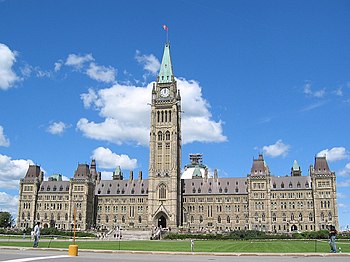 |
| The Centre Block on Parliament Hill, containing the houses of the Canadian parliament (Photo credit: Wikipedia) |
Two long-standing concerns among newcomers to Canada were addressed in the government of Canada’s annual budget, details of which were announced this week. The budget addresses how immigrants might do better once they settle in Canada, as well as how they can better help their families back home.
Pilot loan program made permanent
A pilot program launched three years ago to help internationally-trained individuals get their skills up to Canadian standards by providing small loans will become permanent, it was announced. Earlier this month, a panel appointed by the Canadian government to examine the success of Canadian immigration settlement cited the issue of foreign credential recognition as one of the most persistent and prominent barriers to the economic success of skilled immigrants to Canada.
The Foreign Credential Recognition (FCR) Loans Pilot Project has made it easier for individuals trained internationally to complete the credential recognition process and find jobs that best suit their skills and experience. This initiative aimed to address the underemployment of internationally-trained skilled immigrants to Canada, as a number of immigrants may not have the financial means to take the exams or courses required by Canadian regulations and lack credit history to get bank loans to cover the costs.
The government said that in the first two years, nearly 1,500 loans, worth a total of CAD $9 million, were approved. Less than one per cent of loanees defaulted on repaying the sum. The initiative has been made permanent, with an additional $35 million set aside for future loans over the next five years.
Because accreditation is typically overseen by provincial organisations, funding for this loans program is provided to nine community-based organizations in selected communities across Canada, including:
- S.U.C.C.E.S.S., in British Columbia;
- Immigrant Access Fund, in Alberta;
- Immigrant Access Fund, in Saskatchewan;
- SEED Winnipeg Inc., in Manitoba;
- WIL Employment Connections, in London, Ontario;
- Association Communautaire d’emprunt de Montréal (ACEM), in Quebec;
- New Brunswick Multicultural Council Inc.;
- Canada Microcredit Educators Group, in Prince Edward Island; and
- Immigrant Services Association of Nova Scotia.
Loans can be used for anything from covering tuition for training to the price for licensing exams to child care costs, if it means a person can go back to school to upgrade his or her skills to match Canadian standards.
Remittance services to be improved
The Canadian government has set aside $6 million over five years to improve remittance services for people who want to send money abroad. The budget provides funding to establish a website to help people compare the fees that are charged by different service providers, among other initiatives.
Once new immigrants arrive in Canada, they send more than $24 billion a year back to their home countries, according to World Bank estimates from 2012. At this moment, no Canadian agency tracks this data, though the government has said that this will change in the near future.
However, the costs of sending remittances can vary widely, depending on the financial institutions and countries involved. Banks and remittance agencies make money on both the flat-rate fees and exchange-rate premiums they charge. Canada signed an international pledge to help reduce these costs at the 2011 G20 meeting, and numbers have come down since.
“Remittances represent an important source of income for families in the development world and can help pay for essential needs such as nutrition, education and health care,” stated the budget.
The budget and Canadian immigration
“While it remains to be seen how these projects will work out in reality, newcomers to Canada — including skilled immigrants who arrived recently as well as those who may arrive over the next few years — can take heart that they may experience a softer landing once they enter the labour market. The government of Canada has finally recognised that underemployment of skilled professionals means that the economy does not benefit from their expertise and experience,” says Attorney David Cohen.
“With regard to helping immigrants send money with a greater degree of security, this budget goes some way towards giving immigrants the tools they need in order to make informed decisions. Hopefully, it will allow them and their families to make those decisions with more peace of mind.”
©2015 CICnews All Rights Reserved
Source: http://www.cicnews.com/2015/04/key-canadian-immigrant-concerns-addressed-federal-budget-045087.html






